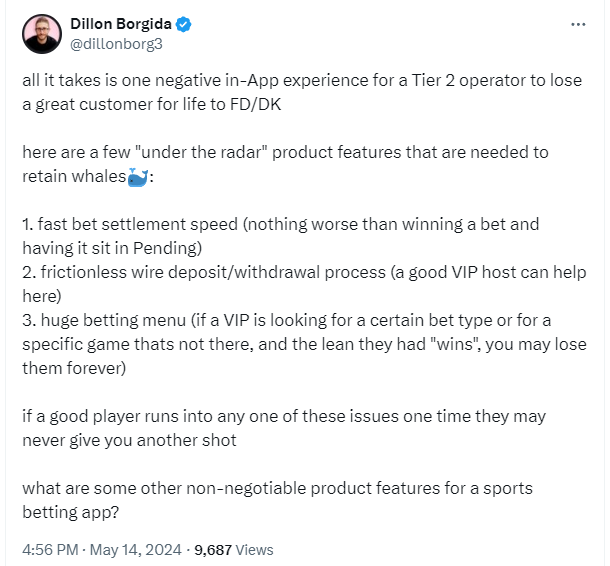No Political Betting For You
The CFTC is ramping up its opposition to election betting markets as it continues to butt heads with prediction market companies like Kalshi and PredictIt.
The Bulletin Board
NEWS: The CFTC is looking to further rein in election betting markets.
LOOSE ENDS: 888 rebrands to evoke; new book from Art Manteris; Nevada regulators weigh in on Dave & Buster’s; WSOP.com testing interstate.
NEWS: The two sides of the cannibalization debate are talking past one another.
QUICK HITTER: Rep. Paul Tonko is fine-tuning the Safe Bet Act, a federal bill that would create several national sports betting policies.
AROUND the WATERCOOLER: Where did my VIPs go?
STRAY THOUGHTS: Consumer protection is a sales pitch.
SPONSOR’S MESSAGE - Sporttrade was borne out of the belief that the golden age of sports betting has yet to come. Combining proprietary technology, thoughtful design, and capital markets expertise, our platform endeavors to modernize sports betting for a more equitable, responsible, and accessible future.
Sporttrade is now live in Iowa, alongside Colorado and New Jersey.
CFTC Takes Aim at Election Prediction Markets
Last week, the Commodity Futures Trading Commission (CFTC) voted to prohibit events contracts, including political events.
The vote was close, with three commissioners voting for and two against the proposal. The vote was along partisan lines, with the two Republican members saying the proposal overstepped the CFTC’s mandate.
The proposal still needs final authorization, which is likely months away.
You can read my feature column on US election betting here.
“Contracts involving political events ultimately commoditize and degrade the integrity of the uniquely American experience of participating in the democratic electoral process,” CFTC Chair Rostin Behnam said in a statement. “Allowing these contracts would push the CFTC, a financial market regulator, into a position far beyond its Congressional mandate and expertise. To be blunt, such contracts would put the CFTC in the role of an election cop.”
Behnam believes allowing the markets could “place the CFTC in the position of monitoring such markets for fraud and manipulation in elections themselves.”
On the other side are the prediction market companies.
“Instead of attempting to shut down and restrict event contract markets, we urge the Commission to embrace innovation and formulate a reasonable regulatory framework that keeps Americans in regulated U.S. markets and not push this valuable activity offshore,” said John Aristotle Phillips, co-founder and CEO of PredictIt.
PredictIt and Kalshi have been at odds with the CFTC for several years, with both companies filing independent lawsuits against the CFTC (details on the PredictIt case and Kalshi case).
The CFTC vote will likely increase tension (and lobbying) on the topic.
Loose Ends: 888 Rebrand; Art Manteris Book; NV Weighs In on Dave & Buster’s; WSOP.com in Test Mode.
Goodbye 888, hello evoke: 888 is in the midst of a “reset,” as CEO Per Widerström termed it. From leaving the US market (as a B2C provider) to its now-official new name and logo: evoke. “We’re delighted to officially launch today following our rebrand from 888 Holdings plc,” evoke wrote on LinkedIn. “Our new corporate entity brings our multi-brand group together with a united strategy, mission, and vision.”
A new sports betting book from a legend: One of the pivotal figures in US sports betting, Art Manteris, has inked a book deal. Per SBC Americas, “The Bookie will reveal the inner workings of sports betting and include a cast of characters which includes some of the biggest names in sports, entertainment, and business.” This is Manteris’s second book, but it will be quite different as he described his 1991 book, Superbookie, as “fun and fluff, while the new book will be “far more timely, hard-hitting and inevitably, more controversial.”
Nevada regulators say no to D&B: Nevada is the latest state to cast a skeptical eye at Dave & Buster’s plan to allow friendly wagers on skill games through its app. Gaming Control Board Chairman Kirk Hendrick said agents had conversations with Dave & Buster’s management about what it termed “unlicensed gaming,” and the company’s Nevada locations wouldn’t offer wagering. Nevada’s decision isn’t much of a surprise, as Nevada has very strict gambling laws. As Jessica Welman pointed out, other skill-based apps like FanDuel Faceoff are not permitted in the state.
WSOP.com interstate network in test mode: WSOP.com is testing its three-state (Nevada, New Jersey, and Michigan) online poker network, according to Pokerfuse, which has been all over the WSOP.com interstate network story. “Pokerfuse has obtained screenshots of the new WSOP Nevada and WSOP New Jersey online poker clients, with WSOP Michigan tables visible.”
SPONSOR’S MESSAGE - SUBSCRIBE NOW to Zero Latency, the new podcast from Eilers & Krejcik Gaming that provides unparalleled insight into the U.S. online gambling industry through interviews with industry insiders and analysis from EKG experts.
Cannibalization Is an Unwinnable Debate
I’m pro-regulation. I believe cannibalization concerns are overstated. I also live in reality, and telling entities that harbor these concerns they are hysterical, scheming, or some combination of the two will not change anyone’s mind.
One group is arguing from a market level:
At the recent SBC Summit, iGaming Capital Founder Melissa Blau (per Covers.com) said, “The numbers are not the numbers… Stakeholders should look more holistically at revenue totals and not just pick aspects that fit their narrative.”
The other side is viewing the situation from the perspective of an individual operator.
As Wynn CEO Craig Billings has said, “As an operator, the TAM doesn’t pay my bills, my share of it does…”
Or, as Cordish Gaming Group President Rob Norton said at the East Coast Gaming Congress, “Why don’t I want iGaming? It’s not because I’m not going to make money. We will. We’ll do fine… Our issue is that we just don’t believe that’s the best path forward in the gaming space.”
Norton doubled down at SBC Summit North America, saying he believes online cannibalizes land-based gambling by 15-23% when you factor in food and beverage and other ancillary revenue streams, per reporting from Jessica Welman.
“I know there are a ton of studies out there, and everybody leans on a different study that supports their narrative,” Norton said during a keynote address. “Well, I didn’t do it that way. I did the studying myself with my own team without an objective, without an agenda.”
“You can say my numbers are wrong,” he said. “The fact is I did that myself, so you’re not going to change my opinion on it because I’m not referring to someone else’s study. I’m doing my own.”
The bottom line is that this is not an argument anyone will win, and that means the status quo is likely to remain in place. Might I suggest starting with these suggestions from a previous feature column I penned?
Quick Hitter: Tonko “Fine Tunes” Federal Sports Betting Bill
New York Rep. Paul Tonko’s Safe Bet Act is in the editing process but will continue to focus on three policy goals:
Reining in sports betting advertising
Installing affordability checks and other RG policies
Restricting the use of AI
Tonko recently spoke at a community event in Saratoga Springs, NY, where he discussed the legislation.
“We put a framework out, now we are word smithing it. We are networking with folks to make certain we get (the bill) exactly as we intended.”
“We’re not looking to outlaw gambling. I think this unrestricted, wild west environment is not helpful to anybody and we think it’s necessary to have some restrictions so there are not these targeted audiences that are preyed upon (by advertising).”
Around the Watercooler
Social media conversations, rumors, and gossip.
Dillon Borgida started an interesting discussion on X by offering some reasons VIP customers might leave a site.
The responses are quite fascinating, and I recommend going through them if this topic interests you or your business. Many people chimed in with their own thoughts and even real-world examples.
Stray Thoughts
When it comes to legalizing gambling, the goal is money; the selling point is consumer protection. The first has to make sense for everyone involved (everyone who matters anyway) before the second becomes the campaign’s public face.








